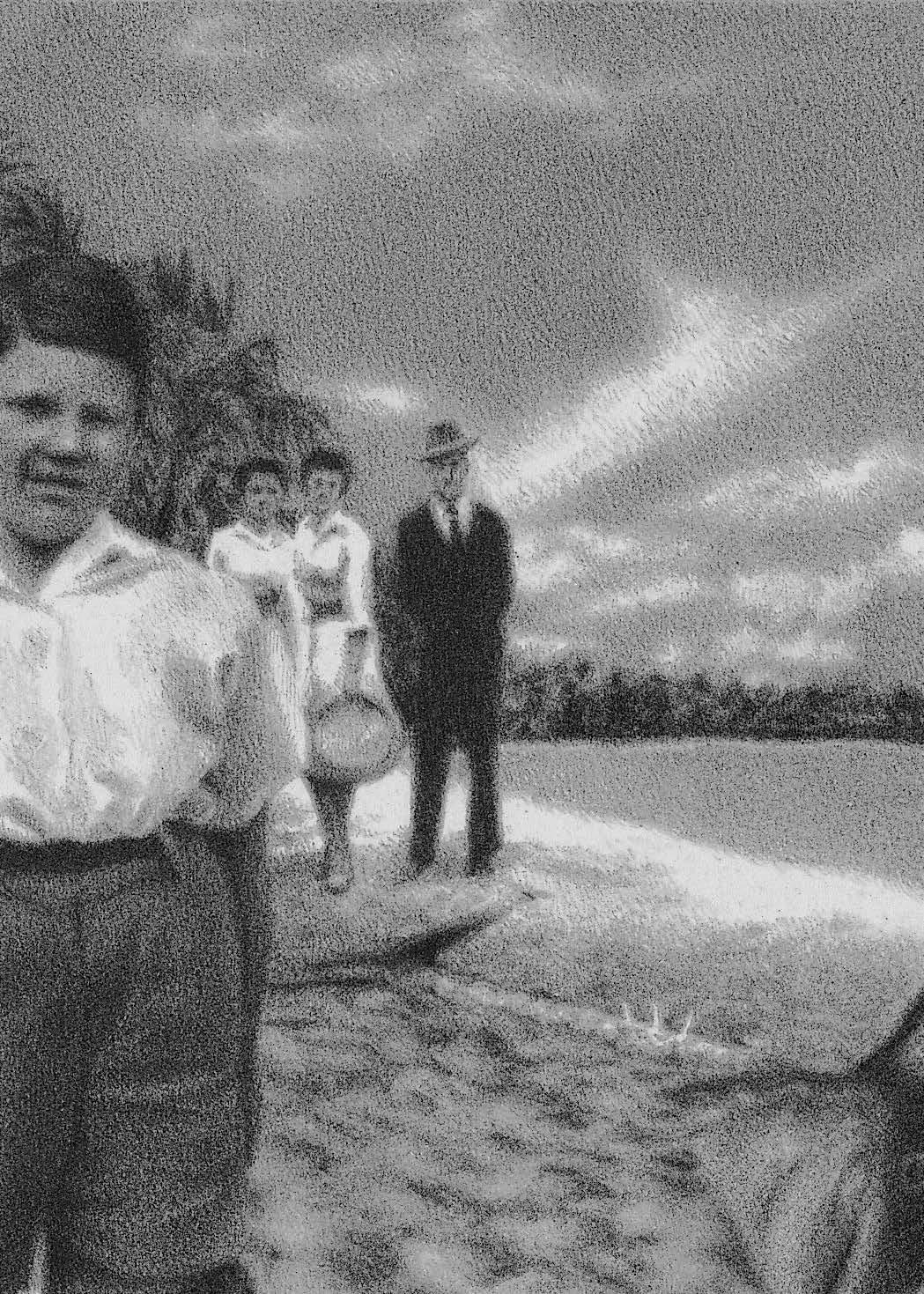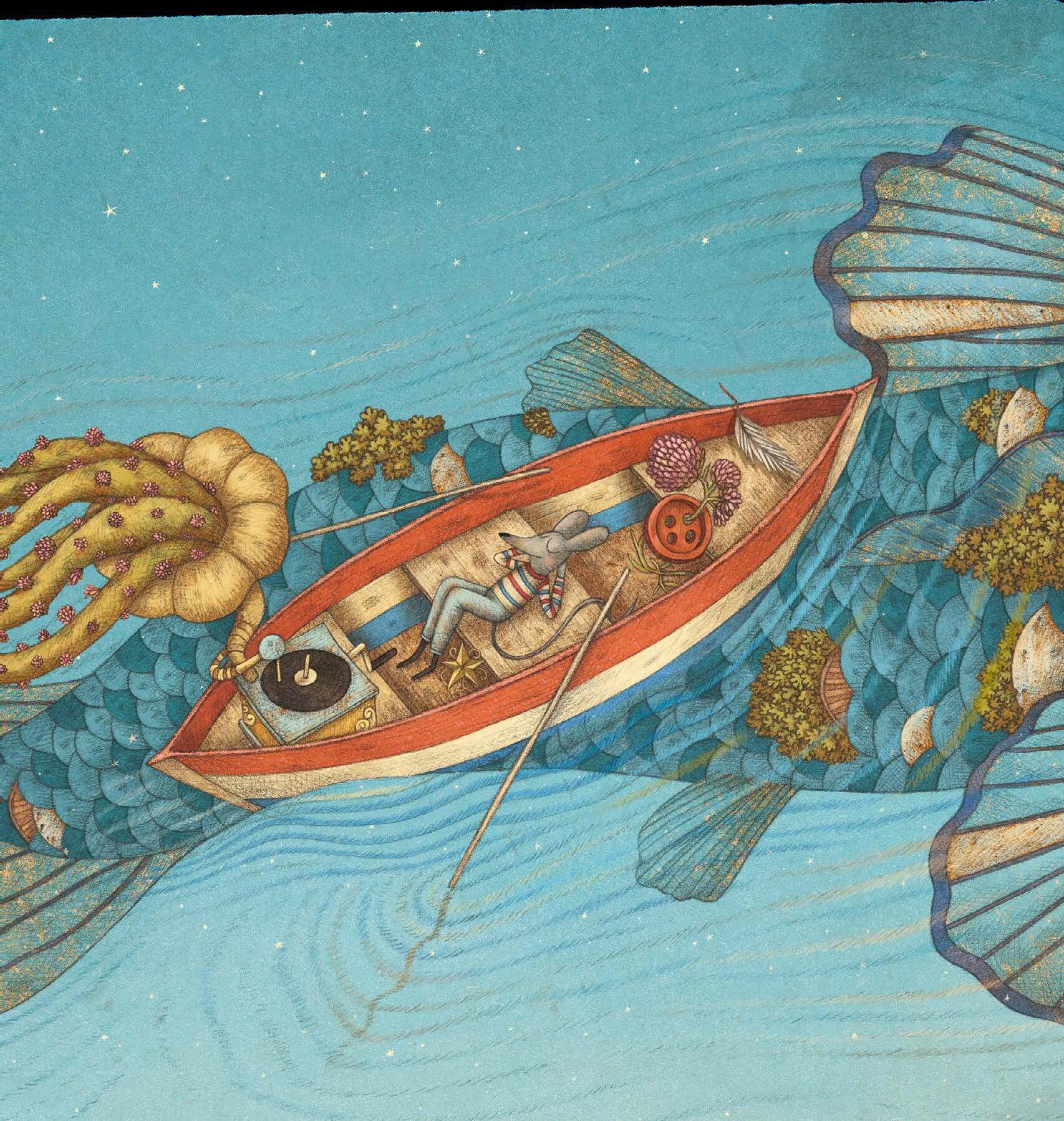ADVANCED LEVEL
On-line course in editorial illustration Edition 2025



On-line course in editorial illustration Edition 2025


An advanced level course in editorial illustration that aims to bring out the personal style of the student through research work both on the narrative side and on the graphic-pictorial side.

On cover and back cover and also in these pages: illustrations by Marco Somà, from "Chi sa che cosa sia la felicità, lo dica", written by Luca Tortolini, Emme Edizioni, 2024.
The Advanced-Level in editorial illustration stands as the progression of the Entry-Level course, and aims to develop and consolidate his themes and techniques.
This course is designed for those who want to deepen their knowledge before entering the Master course, but also for those who want a different path and prefers to approach the professional publishing world by developing a personal book project. The teaching is developed according to the one to one coaching method, following each student in their own personal path on the project phase and on the artistic and technical aspects. The program does articulates in full-immersion front modules (one weekend per month) and weekly revisions (all in e-learning mode). The course will address the project of a picture-book on a text proposed by the student. We will face an important phase of experimentation that will affect the narrative and the executive side of the book, the search for the most suitable technique
Beside: cover by Marco Somà, from "Chi sa che cosa sia la felicità, lo dica", written by Tortolini, Emme Edizioni, 2024
In the next pages: illustration by Isabella Labate, from "Il vecchio e il mare", Kite Edizioni, 2023.

for the student and the text. We will meet some protagonists of the publishing world who will tell us about their professional experience and that will make us understand their point of view; which are the goals of a publishing house, how they evaluate a project, how they make their choices.
Another important appointment will be the mid-term review of the project. In May the works will be under assessment by a publisher, chosen on the Italian or international scene, who will judge the individual projects carried out so far. A unique occasion for the continuation of the work. Finally, the graphic aspect of the book, its editorial form. We will work on the covers and on the inside pages until the final layout.
At the end of the course the students will present their projects to a panel of publishers. This appointment aims to connect the students with major publishing houses, giving the opportunity to make yourself known and have a real feedback on your work.
Chi sa che cosa sia la felicità? Dove si trova?
È forse qualcosa di piccolo o qualcosa di grande? Chi lo sa, non lo tenga per sé.
"Chi sa che cosa sia la felicità, lo dica", written by Luca Tortolini, Emme Edizioni, 2024.

The course is aimed at the realisation of a personal editorial project of professional level. There will be thoroughly dealt issues about the narration through images, the study of the characters and settings, the executive technique and the graphic planning.
The course is addressed to the Entry-Level in Editorial Illustration course’s graduates and to those who have already completed a specific basic training.
The course runs from January to July and is divided into frontal thematic modules (in e-learning) that will take place on the weekends (one per month) held by teachers who are illustrators, publishers and experts. Leading thread of the didactic is the project-book with a text chosen by the student or agreed with the teachers. The course has a coordinator teacher (e-learning mode) with the task of following the development of the editorial projects, and to direct the work on the technical-stylistic side. The publishers involved aim to evaluate the work of the student and to understand the criteria of the choices behind the birth of the book. The course ends in July with the presentation of the projects realised to a commission of experts.
The faculty is composed of professionals and experts of the editorial sector, selected both for the artistic and professional level and for their consolidated didactic experience.
The Advanced-Level course grants five points, added to those from the Entry-Level course, recognized as "Qualification in Specific Education" in the ranking list for the selection of the Master in Editorial Illustration Ars in Fabula.


The central idea about teaching, that connects the different souls who constitute the teaching staff of the school Ars in Fabula, is the firm belief they don't have to transmit preconceived formulas, ready-made recipes.

Beside: illustration by
Above all on the artistic side, when a personal style comes to light, it is also the result of internal investigation, the work on one's own limitations and strong points. The teacher is the one who is able to motivate the emergence of this interiority. It is also imperative to be able to lead the work of the student in the right direction so that one's own technique, graphical or pictorial, is the result of a stylistic achievement, the most suitable tool for an expressive need. Indeed Ars in Fabula has stood out for the diversity and originality of their students style, attributable neither to their teachers nor to transitory trends.









MODULE 1 PLANNING OF THE PICTURE BOOK
January: Text choice and analysis. Revision work. February: Study of characters and settings. Story-board. Pictorial techniques. Revision work.
MODULE 2
COMPOSITION AND COLOUR OF THE ILLUSTRATION
March: Design illustration. Pictorial techniques. Revision work.
April: Technical finalization. The graphic design. Revision work.
MODULE 3 FINALISATION OF THE PROJECT MEETING WITH EDITORS PRESENTATION OF THE PROJECT
May: Review with the editor. Revision work. June: Graphic design of the project. How to present an editorial project. Revision work.
Covers and detail by Roger Olmos, from "L'isola del tesoro", #logosedizioni, 2020.
Catalogues and editorial choices. (the calendar will be communicated to the students)

July: Revision work. Presentation of the book projects.



JANUARY
FRIDAY
FROM 09:00 TO 18:30 TEXT CHOICE AND ANALYSIS.
SATURDAY
FROM 09:00 TO 18:30 TEXT CHOICE AND ANALYSIS.
REVISION (WEEKLY).
FEBRUARY
FRIDAY
FROM 09:00 TO 18:30 STUDY OF CHARACTERS AND SETTINGS.
SATURDAY
FROM 09:00 TO 18:30 STORY-BOARD. PICTORIAL TECHNIQUES.
REVISION (WEEKLY).
Detail by Cinzia Ghigliano, from "Splendide creature", Settenove, to be released in October 2024.


MARCH
FRIDAY
FROM 09:00 TO 18:30 DESIGNING THE ILLUSTRATION.
SATURDAY
FROM 09:00 TO 18:30 STUDY THE EXECUTIVE TECHNIQUE.
REVISION (WEEKLY).
APRIL
FRIDAY
FROM 09:00 TO 18:30 FINALISATION OF EXECUTIVE TECHNIQUE.
SATURDAY
FROM 09:00 TO 18:30 THE EDITORIAL LAYOUT.
REVISION (WEEKLY).
illustration



FRIDAY
FROM 09:00 TO 18:30 REVIEW WITH THE PUBLISHER.
SATURDAY
FROM 09:00 TO 18:30 REVIEW WITH THE PUBLISHER.
REVISION (WEEKLY).
FRIDAY
FROM 09:00 TO 18:30 GRAPHIC PLANNING OF THE PROJECT.
SABATO
FROM 09:00 TO 18:30 GRAPHIC PLANNING OF THE PROJECT.
REVISION (WEEKLY).
Cover and detail by Roger Olmos, from "KOSMOS", #logosedizioni, 2023.


REVISION (WEEKLY).
WEDNESDAY
FROM 09:00 TO 18:30 EXAM.
THURSDAY
FROM 09:00 TO 18:30 EXAM.
The commission will be composed of experts of the sector selected among publishers, literary agents and illustrators and will be designated by the end of June.
Illustration by Cinzia Ghigliano, from "Splendide creature", Settenove, to be released in October 2024.


di Isabella Labate, da "Il vecchio e il mare", Kite Edizioni, 2023.
The course takes place from January to July and it ends with a final exam that is the presentation of the book projects to a commission of experts. The thematic modules, in e-learning, take place on the weekends (one per month). The reviews of the projects (e-learning) are on a weekly basis. The entire Advanced-Level Course lasts 300 hours.
The cost of the Advanced-Level Course is 1.900 € + IVA 22% (tot. 2.318 € ).
Send by email the filled out and signed application form (you can find it in the download section of the Advanced-Level page of the site Ars in Fabula or can be requested from the secretariat) together with a copy of the payment to the secretariat at info@arsinfabula.com
It is possible to pay in one solution or, on request, to pay in installments with five payments, according to the following table. To request the payment in instalments you have to tick the appropriate box in the application form.
1°) 518 € at the moment of the application. 2°) 450 € by the 20 th February. 3°) 450 € by the 20 th March. 4°) 450 € by the 20 th May, 5°) 450 € by the 20 th June.

Please contact the secretariat before making the payment of the registration to check if there is a place available. Ars in Fabula Secretariat: info@arsinfabula.com.
Bank transfer to current account payable to AIF srl (purpose: ADVANCED-LEVEL + last name and first name of the student)
BANK ACCOUNT DETAILS
IBAN IT97A0538713401000003590290
SWIFT Code: BPMOIT22XXX
Current account in the name of AIF srl.
BPER Bank, Macerata Agency, Corso della Repubblica n° 38. Send the receipt of the bank transfer to the email address info@arsinfabula.com.
The cancellation from the course and the reimbursement is provided for, according to italian law, within ten days from enrollment. In case the student finds it impossible to complete the cycle of studies, for proven reasons, the course can be recovered in the following year. The student is however obliged, in case payment in instalments was chosen, to pay the entire course according to the preset schedule.
Management reserves the right to modify anything considered necessary, in its sole discretion, for the success of the course or due to unexpected needs of any kind.

